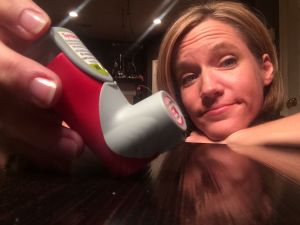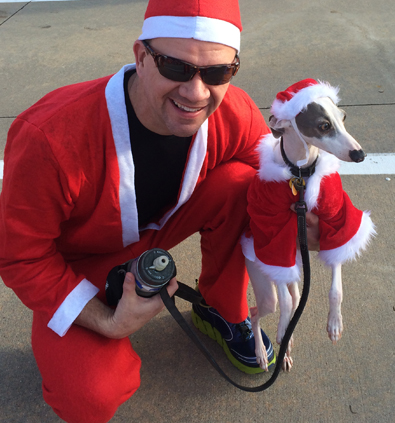Running with Asthma
 When I started running, I expected to have a few breathing problems. It’s normal, right? Every new runner experiences it. At least that’s what the blogs and articles told me. I read them all, hoping to get some insight on how to “beat” it. The advice ranged from “slow down” to “warm up” to “focus on proper breathing techniques” to “it just takes time.” I tried to follow the advice and push through it. The problem was no matter what I did, it didn’t get better. In fact, as the weather began to cool, it got worse…much, much worse.
When I started running, I expected to have a few breathing problems. It’s normal, right? Every new runner experiences it. At least that’s what the blogs and articles told me. I read them all, hoping to get some insight on how to “beat” it. The advice ranged from “slow down” to “warm up” to “focus on proper breathing techniques” to “it just takes time.” I tried to follow the advice and push through it. The problem was no matter what I did, it didn’t get better. In fact, as the weather began to cool, it got worse…much, much worse.
My frustration grew. After all, I’ve been active for most of my life. I am a cyclist. I wakeboard and wake surf. I’m in good shape. I shouldn’t be having these problems.
It turns out I was right. I visited a doctor to see if my problem could be the result of a medical condition, and it was. The diagnosis was both a relief and a stressor. I wanted an answer to my problem, but I didn’t want to deal with another medical problem. Regardless, it existed. I had Exercise Induced Asthma (EIA).
The encouraging news is that many people run with asthma. Even professional athletes and Olympians have overcome asthma with proper medication. Being diagnosed with asthma doesn’t mean you have to stop running — as long as you can control it.
I was sent home from the doctor armed with an emergency inhaler (Xopenex) and a prescription for Singulair. The inhaler was like magic. Almost instantly, I could feel a difference. Breathing was much easier, and my chest felt looser. I used it prior to running and hoped for the best. My run started out great, but it didn’t last. I had to use the inhaler again after only a mile. In addition, I had a negative reaction to Singulair. It was back to the drawing board for me.
I’m still working with my doctor to find the right mix of medication. I struggle every time I run — even if it’s only for a couple of miles — yet I’m determined to find a way to conquer asthma. I may not ever be able to run as fast or as far as those without asthma, but I will run.
One thing I’ve learned from my experience and from others with asthma is that medicine is just one part of the solution. There are other things you can do, and here’s what helps me:
- Warm up first. It’s so hard to do, but take a few moments to warm up when you get started. Walk at a brisk pace or jog lightly, but don’t go from 0 to 60 in the beginning. You will pay for it with an asthma attack if you do that.
- Use interval running. This has probably been the most helpful thing I’ve done. I have to pace myself to keep my breathing under control (even with the medication). By not running for too long and taking brief walk breaks, I have more success. I’m currently running intervals of 2 minutes with a one minute walk. It gives me a 12 minute mile, which isn’t awesome, but I’m hoping it will improve with time and better breathing control once I find the proper mix of meds.
- Cover your mouth. Asthma gets worse in colder weather. If you are running in the cold, try covering your mouth. It made a huge difference for me when I participated in an evening Blacklight Run. I used a black neck gaiter that I wore for snow skiing. It worked perfectly and didn’t make me look like a freak. I could pull it up to cover my mouth when needed and fold it down to look like a small scarf when not needed. It warmed the air and kept my airways from narrowing due to the cold weather.
- Use an inhaler prior to exercise. It seems that most of the advice out there says to use the inhaler about 10 minutes before you start, but taking it about 30 minutes prior to exercise works best for me. Of course, you should always follow your doctor’s recommendations, but if your doctor agrees, you may want to experiment a little to see what works best for you.
- You’ll have good days and bad days. Some runs will be better than others. You may achieve a personal record one day and log your slowest time the next. It varies. Don’t let it frustrate you. Take it in stride, and know that you are doing your best. Don’t compare yourself to others. Be patient, and be proud of your accomplishments on the good days.
Running can be a blast, but it can also be a nightmare for those who struggle with exercise induced asthma. There were times I wanted to give up and never run again, but running has also given me great joy and personal satisfaction. I’ve come to expect a mix of emotions when running — it depends on whether I’m having a good breathing day or a bad one. The most important thing, though, is that I haven’t given up. I’m still fighting. I’m still running.













